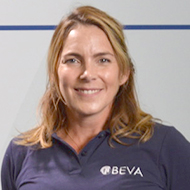
Lucy Grieve will be providing additional veterinary guidance and resources.
The BEVA has announced that Lucy Grieve, past president of the association, has been appointed as Veterinary Projects Officer.
In this brand-new role, Lucy will be responsible for planning and implementing projects that include BEVA member resources, researching issues that impact equine health and veterinary services, and coordinating the association’s responses to consultations.
A graduate of the University of Cambridge, Lucy was the first diagnostic imaging intern at Rossdales and spent seven years as an in-house vet for a pre-training facility in Newmarket. She later returned to Rossdales as an ambulatory assistant.
Lucy has been a member of the BEVA Council since 2012, serving as chair of the Ethics and Welfare Committee and sitting on the Equestrian Sports Committee. She was appointed membership of the Horserace Betting Levy Board (HBLB) Thoroughbred Research Consultation Group and was President of BEVA during 2020/21.
She said: “I wasn’t actively seeking employment elsewhere from my clinical role at Rossdales, but the role caught my attention. Not least because I am acutely aware of how much our profession relies on people within the associations to steer and support the industry in which we work.
“BEVA is very much a reason I became, and still am, an equine vet. Both Rossdales and BEVA have taught me to work hard and play hard, to lift those around you and allow yourself to be lifted in return. Without that ethos, which has very much shaped our profession and is so palpable whenever we get together, our profession would be very different to what we enjoy today.
She added: “I look forward to being a small part of the strong, passionate and committed team, which seeks to provide the same support and community that I have found so invaluable during my career.”
BEVA chief executive David Mountford, commented: “I’m delighted that Lucy has joined the BEVA HQ team. Her close involvement with the work of the association as a Trustee means that she can hit the ground running, and her experience at the coalface will provide a key voice at the heart of BEVA to help support and represent the profession.”
Image (C) BEVA.



 The Federation of Independent Veterinary Practices (FIVP) has announced a third season of its podcast, Practice Matters.
The Federation of Independent Veterinary Practices (FIVP) has announced a third season of its podcast, Practice Matters.